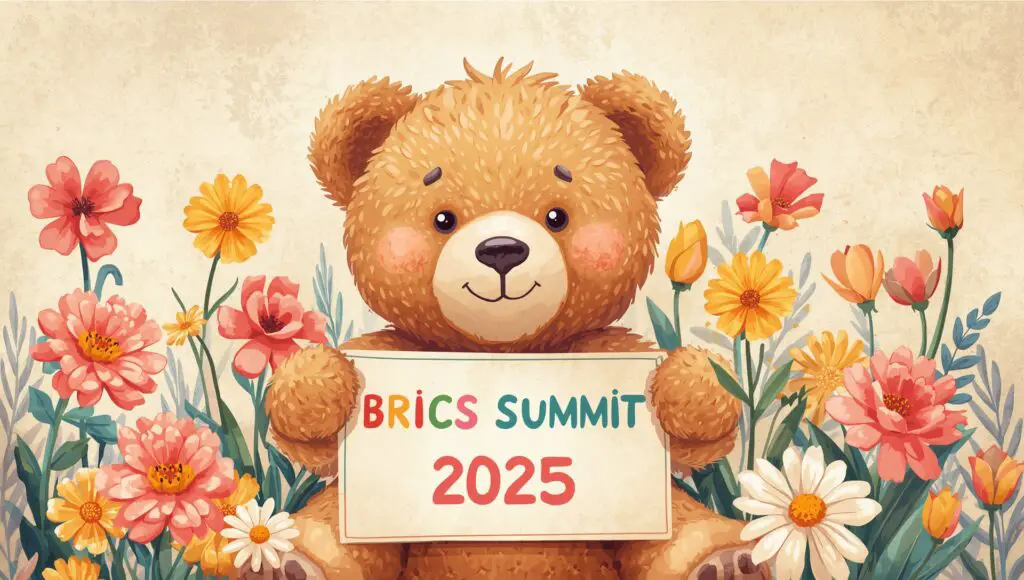Highlights of the 2025 BRICS Summit: the Rio Declaration, the group’s growth, and the Global South’s momentum
The 17th BRICS Summit, which took place in Rio de Janeiro, Brazil, on July 6–7, 2025, was a turning point for emerging economies and showed how the bloc’s vision for a more inclusive, multipolar global governance environment is changing

Theme and Strategic Direction
Leaders from Brazil, Russia, India, China, South Africa, and a few new members met under the theme “Strengthening Global South Cooperation for a More Inclusive and Sustainable Global Governance” to come up with a plan for working together on health, climate, AI, trade, finance, and security (Wikipedia, Council on Foreign Relations, MEA India). The conference resulted with the Rio de Janeiro Declaration, putting out 126 pledges covering global governance, economic cooperation, artificial intelligence, climate financing, and health (Stimson Center, BRICS, Council on Foreign Relations).
Expansion: New Members & Partners
BRICS has gotten a lot bigger. Indonesia formally joined in 2025, making it the first member from Southeast Asia. Egypt, Ethiopia, Iran, and the UAE are also new members. At the same time, eleven more countries joined BRICS, which strengthened the group’s growing presence in Asia, Africa, and beyond (Vajiram & Ravi, ISS Africa, Council on Foreign Relations). This expansion adds political weight and furthers BRICS’ legitimacy as a representative of the Global South (Stimson Center, ISS Africa).
AI Governance: Toward Inclusive Regulation
A notable achievement was the acceptance of a Global Governance of Artificial Intelligence declaration. BRICS leaders called on the United Nations to lead efforts in establishing fair and inclusive global AI principles—cautioning that without equal governance, AI risks widening the digital divide (Wikipedia, Wikipedia, Council on Foreign Relations).

Climate Finance & Sustainable Development
Climate change figured significantly. Leaders reaffirmed commitments under the Paris Agreement, acknowledged the continuing role of fossil fuels for developing economies, and demanded accessible, affordable climate finance to enable a just energy transition (Wikipedia, The Guardian, Council on Foreign Relations). This was positioned within the broader goal of inclusive innovation and sustainable development across the Global South (Vajiram & Ravi, Council on Foreign Relations).
Financial Sovereignty & De-Dollarization
BRICS took considerable advances toward financial unification and minimizing dependency on Western systems. Discussions covered the increase of local-currency use, possible formation of a common payment infrastructure (like “BRICS Pay”), and researching de-dollarization to strengthen economic sovereignty (Wikipedia, [Wikipedia][12], Council on Foreign Relations). A cross-border payment system initiative was affirmed, highlighting ambition to lessen dependence on established global financial networks ([The Economic Times][13], Wikipedia).
Geopolitics & Multilateralism
Tensions with the U.S. erupted at the summit. Former President Trump threatened 10% tariffs on BRICS-aligned countries and blasted the bloc as “anti-American.” In response, the Rio Declaration denounced unilateral trade measures and underlined BRICS’ commitment to multilateral dialogue rather than protectionism (TIME, [The Times of India][15], Council on Foreign Relations, Atlantic Council). Brazilian President Lula’s summary reflected the sentiment: “The world has changed. We don’t want an emperor,” signaling a desire for equitable global leadership ([The Times of India][15]).
### A Divided Landscape: Electrostates vs. Carbon States
Analysts noticed a widening divide within BRICS on energy futures. Electrostates (e.g., China, Brazil) pursuing sustainable energy technology contrast with carbon states (e.g., Russia) relying on fossil fuels. Countries like South Africa, trapped in between, confront structural and political obstacles in shifting to low-carbon economies (Financial Times).

Conclusion: From Rhetoric to Action
In essence, the 2025 BRICS Summit was a pivotal moment—visibly enlarging the bloc, deepening collaboration on AI and climate, urging reform of global institutions, and pursuing financial independence. Symbolically, Brazil successfully used its presidency to magnify shared Global South principles and institutionalize major agendas (Council on Foreign Relations, Atlantic Council, Stimson Center).
Yet, the main test lies ahead: Can BRICS transform its bold promises into tangible action and overcome internal divisions? As India prepares to chair in 2026, the bloc’s coherence and resolution will be vital to preserving its trajectory as an advocate of an inclusive global order (Atlantic Council, Wikipedia, Vajiram & Ravi).



